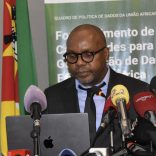Mozambique: Digital data 'oil of 21st century' for economy, social growth - govt
Mozambique averts recession: GDP grows 0.2% in 2020 – IHS Markit

FILE PHOTO - Agricultural production remained resilient and grew 3% during the first six months of 2020. Agriculture accounts for almost 30% of Mozambique's GDP and is dominated by subsistence farming. [File photo: Sustenta]
Consultancy IHS Markit told Lusa today that it had revised its economic expectations for Mozambique last year, now expecting 0.2% growth in 2020 rather than a 2% recession.
“Mozambique’s GDP will have grown by a modest 0.2% during 2020, compared to our previous estimate of a 2% contraction,” economist Thea Fourie told Lusa, adding that the review was based on economic activity during the first half of the year.
“Economic growth exceeded initial expectations and fell by 0.8% during the first half of the year, better than the forecast of a fall of 2.2% from January to June,” the analyst said, pointing out that it was agriculture that ‘saved’ the country from recession.
“The isolation measures taken due to the Covid-19 at the end of March and the disturbances in the supply chains left many sectors under pressure during the second quarter, but agricultural production, which represents almost 30% of GDP and is dominated by subsistence farming, remained resilient and grew 3% during the first six months of 2020,” Fourie said.
In addition, some sectors of the Mozambican economy would grow while others remained in difficulties. “Although the general growth in the third quarter was below potential, activity in some sectors of the economy may start to recover, while others, like agriculture, will remain resilient,” she said.
Asked about the state of negotiations with the International Monetary Fund (IMF), which were interrupted by the pandemic and only resumed at the end of the year, Fourie said that “IHS Markit assumes that relations with Mozambique have improved since 2019, when the Government accepted the Fund’s assumptions, and guaranteed the resumption of financial aid”, but did not guarantee the adoption of a financial assistance programme, as Mozambique has proposed.
The country has already received funds from the IMF: on April 13, Mozambique benefited from financial support from the Catastrophe Containment and Relief Trust (CCRT); the country joined the Debt Service Suspension Initiative (DSSI), and in April, the IMF disbursed US$309 million under the Rapid Credit Facility.
“The budget deficit in 2020 should stand above the initial estimates of 10.4%, and end 2021 at 11.7%,” the analyst proposed. “Public expenditure related to combating Covid-19, together with the growing humanitarian needs of people displaced by terrorists in the province of Cabo Delgado, will compound the deficit in 2020.”













Leave a Reply
Be the First to Comment!
You must be logged in to post a comment.
You must be logged in to post a comment.